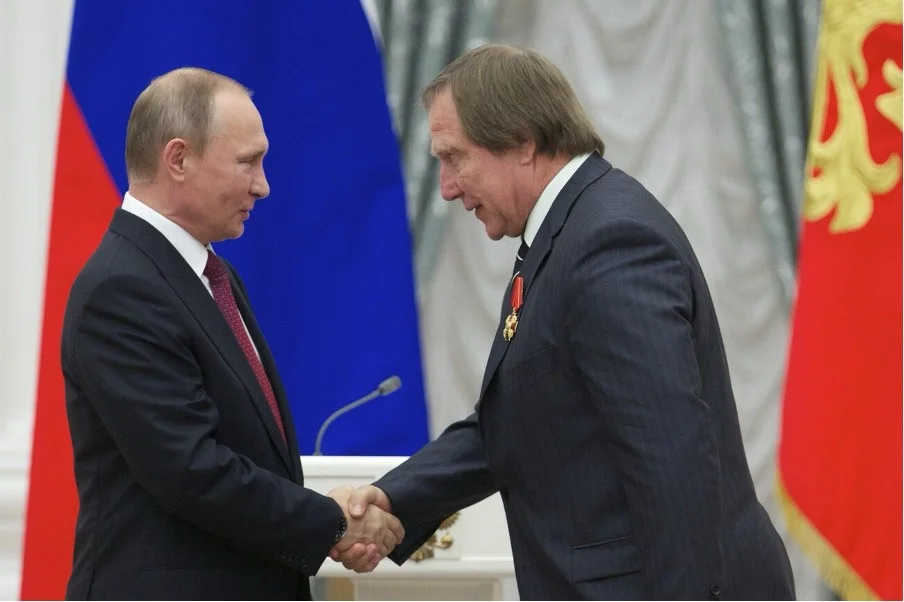
The High Court in Zurich fined four employees of Gazprombank Switzerland for violating financial due diligence obligations. The bankers failed to carry out proper checks on financial transactions involving a close friend of the Russian president.
Last Tuesday, the High Court in Zurich sentenced four former bankers at Gazprombank Switzerland to conditional fines of between 43,000 and 367,000 US dollars for «insufficient diligence in financial transactions». According to Court, the accused did not sufficiently clarify whether Sergey Roldugin, one of Russian President Putin’s closest friends, was the beneficial owner of his accounts at Gazprombank.
The High Court largely confirmed the judgement of Zurich’s District Court in March 2023. However, the accused bankers – among them the former CEO of Gazprombank Switzerland – can appeal the judgement before the Federal Supreme Court.
Suspected straw man
Presiding Judge Beat Gut said that the circumstances of the financial transactions around the accounts of Roldugin «indicated that this could be straw man financing» and the investigations by Gazprombank employees into the origin of Roldugin's funds were merely «farcical measures».
During the reading of the judgement, Judge Beat Gut made it clear that «much of what makes the case interesting for the media» was not relevant to the legal assessment. The question of who really owned the money in Roldugin's accounts and what connections this person had to Vladimir Putin were not the subject of the proceedings.
Nevertheless, the Public Prosecutor’s Office has not made a secret of its suspicion that the funds belong to Putin. The indictment states: «It is notorious that Russian President Putin officially has an income of just over CHF 100,000 [USD 111,000] and is not wealthy, but in fact has enormous assets that are managed by people close to him.»
The revelations
Eight years ago, in spring 2016, an investigation by the German newspaper Süddeutsche Zeitung and other media outlets revealed that Gazprombank in Zurich and Sergei Roldugin were important figures in an alleged money laundering network. The media reports quickly triggered investigations by the Swiss Financial Market Supervisory Authority (FINMA).
The meticulous investigations revealed that between 2006 and 2016, around 8.5 billion US dollars flowed through the accounts of the network at Gazprombank in Zurich. The transactions with other banks as a counterparty amounted to 2.2 billion US dollars, while internal transactions between various Gazprombank accounts amounted to 6.3 billion US dollars. The owners of all these accounts were Putin’s friend Sergei Roldugin and four other Russian parties.
These transactions were clearly dubious – being mainly pass-through flows involving offshore companies with payments frequently justified with fictitious, backdated share transactions or penalties for cancelled sham deals. A company within the network was issued 800 million US dollars of credit by the Russian state-owned VTB Bank with no collateral requirements and virtually interest free. In another instance, a company of Roldugin paid only one US dollar for a claim of 200 million US dollars, which yielded 8 million in interest annually. In addition, Roldugin and the other four parties exchanged ownership and signatory authority for the various accounts frequently and for no apparent reason, like a merry-go-round.
The mastermind
Sergei Roldugin’s involvement in these dubious transactions has attracted a lot of media attention because Roldugin and Putin have been close friends since their early days. Roldugin introduced Putin to his first wife and is the godfather of the Russian President’s eldest daughter. But while Putin brought Russia under his rule as president and autocrat, Roldugin made a career as a solo cellist and artistic director.
Although a lot of money flowed through Roldugin’s accounts, he only played a passive role in the alleged money laundering network. The string-pullers of the transactions were working for the notorious Rossiya Bank. Their employees complained how difficult it was to get hold of Roldugin for signatures. The Rossiya Bank also exerted massive influence on Gazprombank’s business practices.
The Swiss Federal Department of Finance wrote in an investigation that the dubious transactions were hardly ever scrutinised by the employees of Gazprombank in Zurich, and the few critical enquiries were quashed by Rossiya Bank. They employees of Rossiya Bank simply refused to «substantiate the purpose of certain transactions».
According to British journalist and author Catherine Belton, the collaboration between Rossiya Bank and Gazprombank is no coincidence. Putin’s closest confidants, many of them with links to the Russian secret service, control Rossiya Bank, Belton wrote in her book «Putin’s People». Belton also describes, how under Putin’s rule, Rossiya Bank was able to acquire state-owned companies worth billions of US dollars at knock-down prices. In 2007, Rossiya Bank was able to gain control over Gazprombank, Russia's third-largest bank, through complicated and opaque deals.
The tip of the iceberg
The indictment of the Zurich Public Prosecutor’s Office at the District and High Court only relates to transactions carried out between 2014 and 2016, which is only around 120 million US dollars of the total transaction amount worth 8.5 billion. Public Prosecutor Jan Hoffmann declined to explain why the indictment only relates to the period after 2014.
But this is likely due to Rossiya Bank being sanctioned by the US Treasury department in March 2014. The Russian bank was considered a pariah after it suddenly ended up on a par with outlawed banks from North Korea and Iran. To avoid problems with US-authorities, dealing with US-sanctioned banks is usually avoided at all costs in any jurisdictions.
Nevertheless, the sanctioned bank was still able to direct Gazprombank employees in Zurich. Eleven days after the sanctions were imposed, the CEO of Gazprombank Switzerland wrote to an employee of Rossiya Bank that a request to open an account for Roldugin «must be discussed in Moscow». According to the Swiss Federal Department of Finance investigation, the harsh reply by a Rossiya Bank employee followed a week later: «If you are willing to help, I am ready to tell you the details of the operations.» The accounts for Roldugin and one of his partners were opened shortly afterwards.